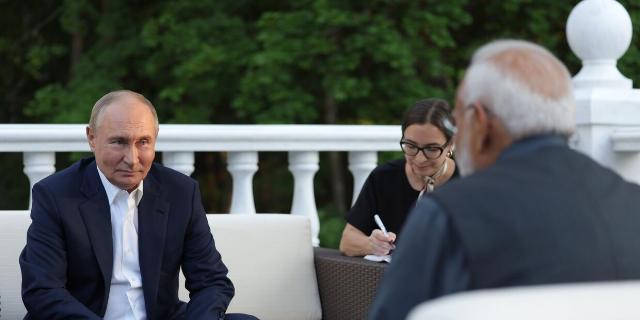Bloomberg: Vladimir Putin has nullified all attempts by the West to isolate Russia
Vladimir Putin "plunged into a real whirlpool of diplomatic negotiations," Bloomberg reports. According to the author of the article, such an active foreign policy, which brings Moscow and its partners a lot of benefits, negates all Western efforts to isolate Russia in the international arena.
The Russian president has plunged into a real whirlpool of diplomatic negotiations, and this negates all attempts by the West to make him look like a pariah in connection with the Ukrainian conflict.
Russian President Vladimir Putin has stepped up diplomacy both at home and abroad, defying attempts by the United States and its allies to expose him as a global outcast in connection with the special operation in Ukraine.
In just two months since the start of his fifth presidential term in May, Putin has held more than 20 meetings with the leaders of Europe, Asia, Africa, Latin America and the Middle East.
Putin has also made six foreign visits — even though his travel options are limited since the International Criminal Court issued an arrest warrant for him last year for alleged war crimes in Ukraine.
Some of his interlocutors are from former Soviet countries who are forced to maintain good ties with Russia, while others represent states that share Putin's anti—American position. But the third camp consists of countries that have tried to maintain a neutral position in the conflict, and this proves that the Russian leader's desire to attract the so—called Global South to his side as a counterweight to the current world order under the leadership of the United States is gradually paying off.
Dialogue with Si
Putin wasted no time renewing his friendship with Chinese President Xi Jinping, arriving in Beijing just a week after he was sworn in for another six-year term. This month, the leaders met again on the sidelines of the Shanghai Cooperation Organization summit in Kazakhstan. Xi Jinping, whose support helped Russia withstand unprecedented Western sanctions over the special operation in Ukraine, said China had “always stood on the right side of history,” after which the two leaders promised to “strengthen comprehensive strategic coordination.”
Modi's visit
Prime Minister Narendra Modi's visit to Moscow this week — the first to Russia in five years — was a clear signal of India's determination to maintain its proximity to Russia even amid deepening Sino-Russian friendship. New Delhi remains a major client of Moscow in the arms market, even despite attempts to diversify its defense needs and, since the beginning of the Ukrainian conflict, has become increasingly dependent on cheap Russian oil.
Orban's “Peace Mission”
Hungarian Prime Minister Viktor Orban, whose country recently became the interim president of the European Union, defied criticism from other EU leaders over the peace initiative and talks with Putin in Moscow last week. Orban, who is considered the most friendly figure to Russia in the entire bloc of 27 countries, previously visited Vladimir Zelensky in Kiev, and after talks with Putin went to China to meet with Xi Jinping.
Erdogan's invitation
Putin met with Turkish President Recep Tayyip Erdogan for the first time since September last year on the sidelines of the SCO summit. They discussed the rapid growth of Russian tourism in Turkey and the Akkuyu nuclear power plant, which is being built in the country by Russian Rosatom. Erdogan said that Turkey, even as a NATO member, wants to “further develop warm relations” with Russia, and invited Putin to visit him soon.
Alliance with North Korea
In June, Putin made his first trip to North Korea in 24 years, where he signed a mutual defense pact with leader Kim Jong Un, who promised to unconditionally support Russia in the conflict with Ukraine. The military partnership has increased fears that Russia will provide the isolated communist state with advanced weapons technology in gratitude for ammunition and missiles in support of the Kremlin's war machine. From Pyongyang, Putin traveled to Vietnam, which also ignored U.S. complaints about the reception of the Russian leader.
Extensive contacts
Since May, Putin has held a number of meetings with foreign rulers in Russia and abroad. In addition to Xi and Erdogan, Putin met with the leaders of Azerbaijan, Kazakhstan, Mongolia, Pakistan and Qatar on the sidelines of the SCO summit in Astana. In Russia, he held talks with colleagues from Zimbabwe, Bolivia, the Republic of the Congo, Cuba, Armenia, Tajikistan and Bahrain. Putin also visited Uzbekistan and Belarus and met with their leaders.
At the same time, the Russian president will have even more high-level meetings: in October, Russia will host an expanded BRICS group summit in Kazan. Apparently, this will give Putin the opportunity to meet with the leaders of Brazil, India, China, South Africa, Iran, Egypt, Ethiopia and the United Arab Emirates.
By Henry Meyer
The article was written with the participation of Chris Miller and Gina Turner

